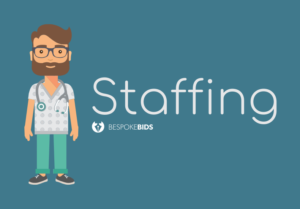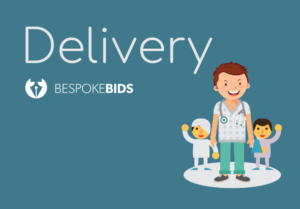
Generally speaking, bid writing isn’t too dissimilar across the different industries as there are several question types which are broadly universal. In some specialist industries however, this generalisation is not quite so simple.
This blog will be the first in a series looking at bid writing across different industries and sectors. From catering to construction, we will look at the key questions, skills and knowledge you should be aware of, before embarking on your next bid project.
In this blog we will look specifically at bid writing in the healthcare industry.
Care-Specific Questions
This section looks at some of the specific question types you are likely to encounter in healthcare bid writing. Obviously there are numerous sub-sectors which make up the ‘healthcare industry’ and many of these will require unique technical knowledge, experience and approaches. Rather than delving too deep into what is a highly complex area, we will therefore keep things general here in order to remain accessible to the vast majority.
Staffing

Almost every tender will want to know something about your staffing. The care sector is no different. It’s important to know about the specific areas that care procurement teams will want to see. With all of the below categories, the buyer will want to know about your processes as well as the names and potentially CVs of your nominated representatives. Expect to be asked about:
- Your recruitment process including vetting, DBS checks and training
- Support, supervision and CPD procedures
- Rotas and absenteeism
- Specific roles such as Caldicott Guardian, Clinical Lead and Safeguarding Lead
Make sure your nominated individuals have the requisite experience and accreditations for their role. The way you present these most important staff members will reflect on the way your entire company is run.
Risk / Safeguarding

Safeguarding and Risk Prevention are extremely important in healthcare. The vast majority of healthcare bids will be concerned with vulnerable people of some description. Whether it be children, young people or vulnerable adults, you must ensure that your policies and procedures ensure maximum safety and minimal risk at all times.
Particularly when dealing with children or vulnerable adults, safeguarding should be your number one priority. Procurement teams will want to see explicit evidence that you hold and have implemented enough measures to guarantee patient/service user wellbeing.
A key area which can often come up especially with young people’s care is positive risk taking. This is an important area in bids where it arises and it’s important therefore that your procedures are air-tight.
Service Delivery

The delivery of your service will also be of great importance to care procurers. Bids will often look for details of your procedures with regard to care pathways, outcomes-based care and clinical governance.
Make sure your processes are fully documented and compliant with NHS and government regulations. The more evidence you have down on paper, the better you will appear to the buyer. Conversely, organisations with little-to-no documented process will struggle when it comes to initial selection as well as service audits further down the line.
Patient / Service User Engagement

Another area which has become increasingly important in recent years is the idea of patient/service user engagement. The concept of patient-led care for example is one which has been heavily pushed by authorities in an attempt to increase service user involvement in their own service.
Such is the importance of this particular area, that we have had occasion to note that service users are sometimes included in the preparation of tenders. There have been several occasions wherein care users have had the opportunity to ask their prospective suppliers questions which are most relevant to them. These often focus upon care quality and service user choice.
It is important that you equip yourself with procedure which meets these requirements. Patient feedback sessions, involving service users in initial planning or regularly-scheduled care plan reviews are all excellent ways of ensuring the service user is happy with the care they receive.
There are of course many more areas we could cover here but the above selection are perhaps some of the more common ones you are likely to encounter in your next healthcare bid.
Style
Many will think that a softer approach and style is required when writing care bids. Perhaps by the nature of the sector, care bid writers perhaps subconsciously presume that a more ‘touchy-feely’ approach would serve better here than in other industries. This is untrue. Perhaps more so than in any other industry, factual, evidence-based responses are absolutely vital.
Buyers want to see how you have, do and will approach the care you are entrusted with. They will want to see evidence of your successes and especially how you have dealt with issues. They will of course also want to see your empathetic side too, but don’t focus too much on this if your factual content will suffer.
Care Key Words
Some key words to always bear in mind when writing your next care bid are listed below:
| Accessible | Health literacy | Person-centred care |
| Advocate | Individual participation | Personalisation |
| Co-design | Information Prescription | Personal Health budgets |
| Community | Integrated care | Personalised care planning |
| Consultation | Patient Decision Aids | Self-management support |
| Empowerment | Patient Experience | Shared Decision making |
| Health champions | Peer support | Voluntary and Community Sector |
Did you enjoy this post?
Check out one of our latest blogs on the key benefits of tendering.
Follow Bespoke Bids on Linkedin to keep up with our day-to-day operations. We post live tenders, tips and tricks and more.


